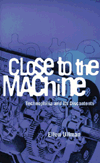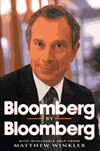|
|
Technology (and ego) gone too farTwo radically different views of the glory and the gore of information technology |
This month: two autobiographical volumes by Jewish Ivy League baby boomers who found themselves in the information technology world. One is a set of ruminations by a software developer, a former radical whose notions of establishment and rebellion are increasingly out of sync with the times; the other is a vanity piece by a computer and media industry mogul masquerading as a Wall Street trader (or vice versa). (2,200 words)
|
Mail this article to a friend |
Ullman's writing is fun to read, but for the aging software engineer this book is more than just fun. It hits very close to home.

|
Ullman's profile, while not exactly mainstream American, is one that ought to be familiar to you if you have spent a long time in the software field. Certainly it's one I recognize: she's a baby-boom era New York Jew who went to an Ivy League school and rebelled -- joined the Communist Party and came out as a bisexual. While her more prosaically-minded boomer/Ivy League brethren found yuppie careers in banking and law, she settled into life as a programmer -- the career option for those who considered themselves outsiders to the mainstream, yet still wanted a good paycheck and job security. Now she's in her forties, no longer a communist, and living in a society where her concept of mainstream versus rebellious culture has turned inside out.
Today's most storied young adults, as Ullman observes, have a confusing set of attitudes that mix those of the establishment with those of what she would call iconoclasts. They are "libertarian capitalists," a phrase that, in 1985, would have conjured up scary images of the John Birch Society. Though they work hard, they prefer the virtual lifestyle to working for a large, bureaucratic company; they don't think much of the social consequences of their work (it's just cool technology); and they have no shame in wanting to get rich.
|
|
|
|
|
Technology gone too far
In Close to the Machine, Ellen Ullman expresses increasing
bewilderment about this new set of technology-engendered attitudes.
She reveals a period of a few months in her life as a contractor -- a
software designer and lead programmer -- covering her professional, as
well as her personal life. The first project Ullman describes --
designing an AIDS patient referral system for the San Francisco city
government -- throws the above paradoxes into sharp relief: Years ago,
Ullman would have been proud of this ostensibly humanitarian use of her
skills. But now it's degrading pro-bureaucracy work. And she's using
bush-league end-user software instead of cool system software.
Romantically, Ullman becomes entangled with the 1990s version of James Dean hip rebellion: a twentysomething cypherpunk (privacy freak) who has equally big technical ideas, ego, libido, and hair. His ideas for a startup company are naive, and instead of golly-goshing over his plans Ullman pricks his balloon by asking pesky design questions. He represents the sexual allure of wild, untamed youth, which she eventually decides is no longer interesting.
Many technologists surely know what it feels like to reach a certain age and realize that technology has gone too far; that its effect on one's everyday life is becoming uncomfortable; that the changes it has wrought have passed into the unrecognizable. Mainframers felt it with the advent of the PC. Ellen Ullman feels it with today's technologies. This book gets to the heart of that feeling.
Ullman's a highly competent engineer: she keeps up with the latest development technologies and is in demand for desirable, lucrative consulting assignments. She's certainly not a washed-up old fuddy-duddy, and she still feels the adrenaline rush of figuring out new technology in real-time. She's mastered JCL, COBOL, C, and Unix. Now she's confronting C++, Windows NT, and Java. Although they're unfamiliar to her, we know she'll learn them fast if needed. But she's beginning to think "Oh, not another system" rather than "Wow, cool."
Some of the fruits of high technology begin to disturb her. She finds it creepy that one can create the illusion of a "company" with nothing more than a Web page, a voice mail service, a fax machine, and a post office box address at Mail Boxes Etc.
Ullman's highly expressive style of introspection lets this book turn on mental light bulbs in those of us who have reached this point in our lives. Close to the Machine is a relatively lightweight book -- a quick, pleasant, one-or-two-sitting read. It is also not a single story, but one that skips around among several. The unifying themes aren't obvious; they lurk below the surface. This book's profundity sneaks up on you, making you think more about your own situation -- perhaps disturbing you a bit. An evening on the couch (pun intended) with this book is an evening well spent.
Bombast by Bloomberg
Michael Bloomberg is another Jewish baby boomer who found his way into
the computer field. But he did it a completely different way. The
title of his business autobiography, Bloomberg by Bloomberg
ought to give you some idea of just how different. Whereas Ullman's
book is an extremely candid, almost solipsistic piece of introspection,
Bloomberg's is practically an autohagiography.
You may not be familiar with Michael Bloomberg and his eponymous company, but if you live in the metropolitan New York area or work in the financial markets, Bloomberg is probably a household name to you.

|
After receiving his golden parachute, Bloomberg decided to go entrepreneurial rather than join some other Wall Street firm. He and three other partners founded the firm that was originally called Innovative Market Systems. Their product was a bond trader's workstation, one that provided instantaneous information on prices and market conditions, performed analysis that traders would normally have to do by hand, and even included an e-mail system. Their first customer: the securities giant Merrill Lynch.
Bloomberg the true "convergence" company
Make no mistake about it: Bloomberg was and is a client-server network
computing company -- one that now does $1 billion in annual sales. It
chose to develop its own terminals, rather than use standard PCs, for
several reasons: First, standard PCs were in their infancy in the early
80s; they were far from standard in the mainframe and minicomputer
dominated financial world. Second, Bloomberg felt that typical
computer keyboards, with CTRL and F keys, would be too cryptic for bond
traders to use and would take up too much desktop space. Nowadays,
Bloomberg takes criticism for not offering its system on standard PC or
workstation clients. It responds to this by continuing to offer
specialized hardware functionality, such as its compact keyboard (real
estate on traders' desks is a hypervalued commodity) and custom
display, which has dual flat-panel screens.
The company has also expanded beyond financial workstations to digital and broadcast multimedia. Bloomberg has become a news-gathering service and provides news through several media: an all-news radio station in New York, cable and satellite TV channels, a Web site, and print magazines. Its competition is no longer merely the traditional financial information service providers -- the Dow Joneses, Reuters, Standard & Poors of the world. Now, the company competes with CNN, News Corp., Microsoft, Yahoo!, and so on. By staying on top of the capabilities of digital information systems, it has become the true, multipurposing, "convergence" company in a world of convergence planners and convergence wannabes.
When viewed this way, Bloomberg is a truly remarkable business -- but curiously, that is not the way Michael Bloomberg's book explains things. He is not a long-range strategist or introspective contemplator. Rather, he's quick on his feet, a short term thinker and workaholic who chooses not to over-analyze or concentrate on the big picture. All of these attributes are obviously the product of years of training in the fast moving, instinctual world of the Salomon Brothers trading floor. In Bloomberg by Bloomberg, he explains each move into a major new business venture as a gut-feel process that took place over a couple of days, not as part of some grand strategic vision.
Bloomberg has grown his business into a media empire in 16 short years because he focused on the specific needs of an affluent target customer whom he understands extremely well. He created his initial business to serve that market with products that his customers find indispensable, and in doing so, built a solid base from which to grow. Subsequently, he has expanded his business to include other products and services that meet the needs of the same core group of customers, while at the same time bringing other customers into the fold. And he has used digital technology to make it easy to move into new businesses. For example, every scrap of audio that his newsrooms create is in digital form -- easy for editing, transporting, and repurposing to multiple services. These are all lessons that older media conglomerates and technology companies alike should embrace as they attempt to do something more with "convergence" than merely discussing it at board room strategy meetings.
This is all exciting stuff; yet those who read Bloomberg's book looking for deep business insights are bound to be disappointed. You get a feel for the man's management style and the company's culture, which, not unbelievably, mixes the wild-frontier mentality of high tech with the energy of the trading floor. Probably a stimulating yet stressful place to work. (I've been to their main offices in New York City. The place is a maelstrom of activity, a haven for gadget freaks, and has about as many people per square yard as Grand Central Station at 5:30 p.m. -- or, for that matter, the floor of the New York Stock Exchange. Not a good place for claustrophobes or reclusives.) But his narrative suggests that, when he started the business, he hadn't the slightest idea that he would be building a media company worthy of Turner or Murdoch. The man himself comes across as an impulsive, self-centered egotist -- otherwise why would he write the book? -- but one who might be forgiven his venality because of his great success.
His writing style (or perhaps that of his ghostwriter, Matthew Winkler,
who is one of his top journalists) is punchy, colloquial, and
entertaining. The book is a fun, fast-paced read. Check it out and get
to know a real state of the art media and technology business. ![]()
![]()
Title: Close to the Machine: Technophilia and its Discontents
Author: Ellen Ullman
Publisher: City Lights Books
ISBN: 0872863379
List price: $13.00
Title:
Bloomberg by Bloomberg
Author: Michael Bloomberg and Matthew Winkler
Publisher: John Wiley & Sons
ISBN: 0471155454
List price: $25.00
|
|
Resources
About the author
![]() Bill Rosenblatt is market development manager for media and publishing
industries at Sun Microsystems Inc.
Reach Bill at bill.rosenblatt@sunworld.com.
Bill Rosenblatt is market development manager for media and publishing
industries at Sun Microsystems Inc.
Reach Bill at bill.rosenblatt@sunworld.com.
If you have technical problems with this magazine, contact webmaster@sunworld.com
URL: http://www.sunworld.com/swol-02-1998/swol-02-bookshelf.html
Last modified: